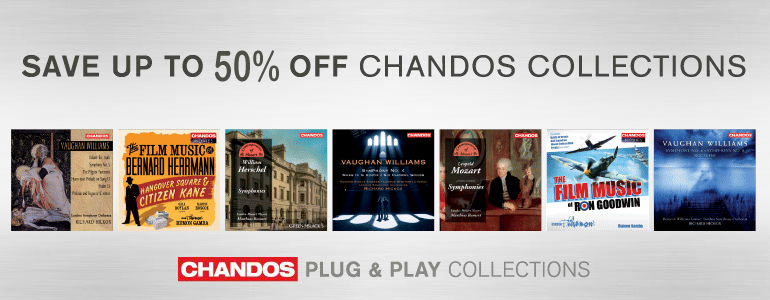Each USB stick comes complete with audio (both lossless and mp3) , PDF booklets, print quality artwork and instructions on how to burn the music to a CD.

Vaughan Williams Symphonies The symphonies of Vaughan Williams represent a high point in twentieth-century symphonic writing. From the opening of the First, which Vaughan Williams named A Sea Symphony – one of the most thrilling openings of any symphony – to the mystical qualities of the Fifth, each symphony combines a distinct character with a searing musical inspiration, all of which has inspired many conductors of the recording era, none more so than Richard Hickox. Hickox had a special affinity with British music in general and that of Vaughan Williams in particular. Alas, he died before being able to complete his Vaughan Williams cycle, but did commit a now classic recording of the original version of the Second, the London Symphony (A Gramophone Award winning ‘CD of the Year’), as well as a blazing account of the dramatic Forth and a simply magical account of the Fifth. Also included are the exhilarating Overture to The Wasps, the striking Mass in G, the tunefully pastoralNorfolk Rhapsodies, and George Butterworth’s haunting The Banks of Green Willow. This memory stick features as a bonus an insightful interview of Richard Hickox by James Jolly about Vaughan Williams. |
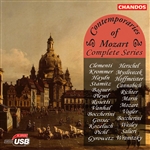
Contemporaries of Mozart, Volume 1 , Volume 2 , Complete The Contemporaries of Mozart series may contain unfamiliar names, yet these composers offer an inexhaustible supply of melody combined with a fresh vitality all wrapped up in delightful orchestrations. Style and elegance are hallmarks of Matthias Bamert’s performances of this delicious repertoire, with the London Mozart Players bringing out all the many nuances of these unfailingly entertaining works. Whilst the styles of the composers may be similar, each has its own definite characteristics, from the Sturm und Drang of Vanhal’s vigorous symphonies to the classical charm of those of Clementi and Rosetti, the exhilarating allegros of Boccherini and Myslivecek, the operatic drama of Salieri, and the unique double-orchestra arrangement of Marsh’s ‘Conversation’ Symphony – each composer offers something individual to admire. |
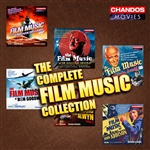
Film Music, Volume 1 , Volume 2 , Complete These two film music collections present film scores from a golden age. The genre attracted many distinguished composers from the concert hall, such as Korngold, Shostakovich, Alwyn, Bax, and Vaughan Williams. Others became famous through the medium of film, notably Goodwin, Addison, and Herrmann. All of them wrote highly atmospheric and colourful film music which evokes vivid mind pictures on the musical merit alone. These collections are hugely varied, from the irresistible tunefulness of Ron Goodwin’s film music (who can forget the delicious Miss Marple theme?) to the powerfully atmospheric film scores of Vaughan Williams. A newly assembled suite of Herrmann’sHangover Square (with its powerfully brooding ‘Concerto Macabre’) is one of many other highlights, as are the many examples of classic British film scores. The recorded performances, mainly with the BBC Philharmonic under Rumon Gamba, received superb critical acclaim, for both their musical qualities and sonic brilliance. |
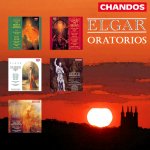
Elgar Oratorios Elgar’s oratorios represent the heart of the British choral tradition. In these magnificent works, Elgar poured some of his finest inspiration, producing scores that are both spiritually exhilarating and searingly dramatic. Whilst The Dream of Gerontius is considered his masterpiece in this genre, the other works are hardly less inspired, with rarities such as The Black Knight emerging with tremendous vividness in these performances. The success of these recordings can be attributed to Richard Hickox, a conductor steeped in the British choral tradition and an inspiring force in the recording studio. In works such as The Light of Life, The Apostles, The Kingdom and Caractacus, Hickox’s supremely idiomatic approach brings out all the richly varied detail with both power and warmth, whilst the impressive line-up of soloists – and the famous Chandos sound – ensures that Hickox’s Gerontius is regarded as one of the finest choral recordings of the digital age. |
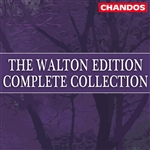
Walton Box, Volume 1 , Volume 2 , Complete Sir William Walton is one of the great composers of the twentieth century. In each of the genres in which he worked – symphonic, chamber, opera, or film – his style is distinctive, colourful, and varied. He has written arguably the finest film score of all time, the inspired music to Henry V(1944, Olivier), though his scores for Richard III (1955, Olivier) and Hamlet (1948, Olivier) could equally be given that epithet. The heart melts at the theme he wrote for Went the Day Well (1942) – a cinematic masterpiece – whose music was rescued by Christopher Palmer and is here included in A Wartime Sketchbook. In fact, these two USBs comprise the entire output of the composer: the two great symphonies, the masterful concertos, the colourful ballets, the choral music (the strikingBelshazzar’s Feast – one of the great choral works of the twentieth century), the magnificent operaTroilus and Cressida, and, of course, his most famous work, the deliciously quirky Façade, with the composer’s widow, Susanna Walton, narrating Edith Sitwell’s delightfully eccentric texts with her characteristic style and oodles of personality. |

Arnold Sir Malcolm Arnold would be remembered today if he had only written the Eight English Dances. These delightfully tuneful miniatures are masterpieces of the light-music genre at which this composer excelled (his Cornish, Scottish and Irish Dances, also included here, are equally enjoyable). Of course, that is not all there is to this composer. His symphonies are all equally impressive: powerfully written, red-blooded works, full of the vibrant rhythms and orchestral colour for which he is famous. One highlight of this collection is Rumon Gamba’s superb collection of overtures, each a vividly characterised piece of music, containing at least one striking tune. Tam o’ Shanter is a riot of a piece, whilst A Grand Grand Festival Overture is scored, among others, for no fewer than three vacuum cleaners and a floor polisher! His film music is well represented (Arnold wrote more than 100 film scores), the collection including the iconic music to The Bridge on the River Kwai as well as some delicious light numbers, such as the jaunty ‘Samba’ from The Captain’s Paradise. |

Hummel There is clearly something about Hummel’s music which appeals to the public, perhaps as a result of the philosophy on which Hummel based his art, which was to ‘enjoy the world by giving joy to the world’. Indeed, his music is tuneful and unfailingly entertaining, but it is perhaps the combination of classical proportions and a robust early romanticism that makes his music so enjoyable today, for performers and audiences alike. This collection includes his most famous work, the Trumpet Concerto, and the best-selling recording of the well-known Piano Concerto in A minor, a work full of dazzling virtuosity as well as much poetry, wonderfully brought out by Stephen Hough. Also notable in this collection are the rare but piquant concertos for mandolin and for bassoon. Among other surprises is some especially vivacious and tuneful ballet music, conducted by an artist who has made something of a speciality of this composer, Howard Shelley. Shelley is also the soloist in many of the piano concertos. |
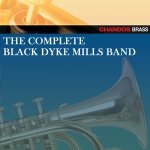
Black Dyke Mills Band Chandos began life recording brass bands and quickly became famous for championing their repertoire. Among its artists was the legendary Black Dyke Mills Band, founded in 1855 and perhaps the most famous of all UK brass bands. The Band has built up a reputation for both the virtuosity of its players and the striking variety of its repertoire, as this USB stick demonstrates. Featuring a range of colourfully written works, the collection includes some of the Band’s most famous recordings, for example the classic ‘Volcano’ and ‘Epic Brass’, as well as less familiar collections, including the scintillating collection called ‘Black Dyke Plays Rossini’. |
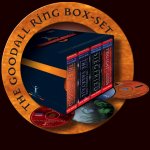
Wagner’s Ring Wagner’s epic Ring cycle represents one of the peaks of operatic achievement in the history of western music. It not only offers a lifetime of study in its labyrinthine twists and turns of plot, which can be appreciated on so many different levels, it also contains some of the finest and most exhilarating music in the operatic repertoire. This famous recording – sung in English – from the 1970s, featuring a magnificent cast under the legendary Wagnerian conductor Sir Reginald Goodall, is one of the greatest of the stereo era. |
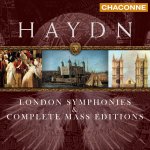
Haydn’s Masses Haydn’s Masses represent some of the most enjoyable and richly-rewarding music in the choral repertoire. Sacred music and especially the masses were always a part of Haydn’s long life and, perhaps because Haydn himself was a devout man, they are imbued with a striking directness which communicates readily to the listener today. Richard Hickox recorded the complete Masses in highly acclaimed performances, noted for their freshness and vitality, supreme musicianship and warmly vivid sound. Each of these Masses finds the composer on inspirational form, with exhilarating choruses, imaginative orchestrations, gorgeous melodies – all presented with both drama and excitement. |
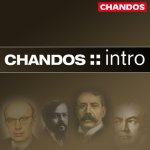
Chandos’s Into series Chandos’s Intro series was designed to introduce less experienced collectors to the great master-pieces of the classical repertoire. Here you will find some of the most popular pieces in the classical repertoire, from Holst’s The Planets, Elgar’s Enigma Variations, Beethoven’s Fifth Symphony, Mendelssohn’s The Hebrides Overtures and Italian Symphony, Prokofiev’s Peter and the Wolf, as well as masterpieces by Vaughan Williams, Shostakovich and Debussy. But the series also includes some less well known music from the masters. For example, you will find Khachaturain’s flamboyant Third Symphony along with his popular music from the Spartacus and Gayaneh ballet suites, as well as a programme of the always entertaining and unfailingly imaginative Percy Grainger. |














 My Wish List
My Wish List

